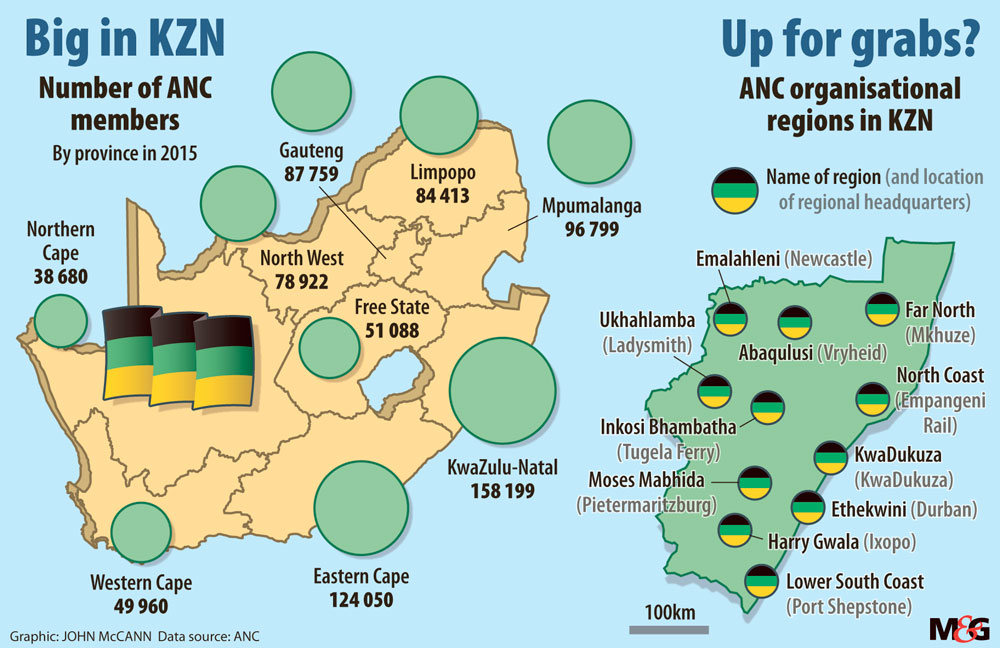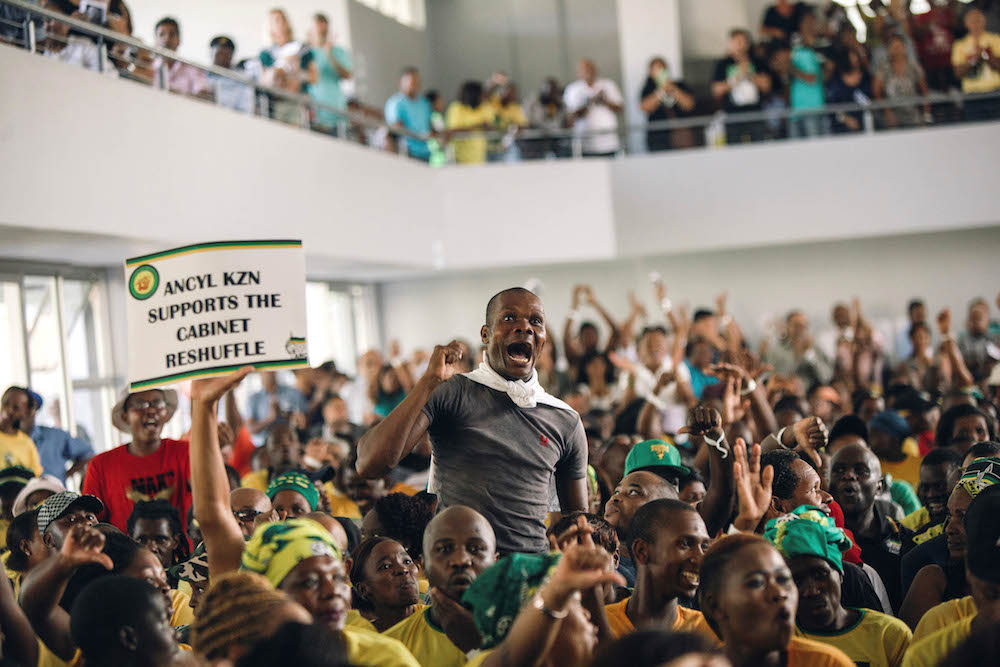Ramaphosa rising: Deputy President Cyril Ramaphosa went on a charm offensive in Nquthu in KwaZulu-Natal last week.
ANC deputy president Cyril Ramaphosa’s presidential campaign received a huge boost this week by scoring significant support in KwaZulu-Natal – six of the 11 regions said an increasing number of branches want to back him to succeed Jacob Zuma as party president.
KwaZulu-Natal is the ANC’s biggest provincial support base and was instrumental in electing and retaining Zuma as president in 2007 and 2012.
Ramaphosa’s campaign is threatening to divide the province, with regional power brokers such as party treasurer general Zweli Mkhize and former provincial chairperson Senzo Mchunu seen as being allied to the deputy president.
This week the Mail & Guardian spoke to leaders in all 11 regions in the province, who revealed that Ramaphosa’s bid to become president resonated with dozens of branches – from rural KwaZulu-Natal to the metropolitan city of eThekwini and the posh North Coast area.
The reasons cited by some regions for supporting Ramaphosa include “a concern over what is happening in government and corruption” and others pointing to the qualities he has to take the party forward.
Despite Zuma’s insistence that South Africa is ready for a woman president, enduring patriarchal attitudes also emerged as a justification for supporting the ANC deputy president.
But this early shift towards backing Ramaphosa will have to be sustained until December. With most regions due to elect new leaders between June and August and the ANC’s auditing of delegates only in its infancy, an endorsement for him could still be contested.
“When you talk of regions and support in KZN [KwaZulu-Natal], you need to start by ruling out Moses Mabhida [in the Pietermaritzburg area]; Zuma’s influence there is immense,” a regional leader told the M&G this week on condition of anonymity, because the ANC had not yet opened its succession debate.
“Which leaves you with 10 regions, and I can tell you that [a number of branches in] eMalahleni, Far North, Harry Gwala, Bhambatha, Lower South Coast and Abaqulusi support Cyril,” the leader added.
This week, regional leaders still described the province as the main support base for Zuma and his preferred successor in the ANC presidency, but said Ramaphosa’s growing popularity couldn’t be ignored.
Known as a stronghold for Zuma and an important constituency for former home affairs, health and foreign affairs minister and African Union chairperson Nkosazana Dlamini-Zuma for her campaign as party president, KwaZulu-Natal faces the prospect of going to the national conference as a divided voting bloc for the first time since the ANC’s 2002 conference in Stellenbosch.
“When the decision on a candidate is taken, the kraal would have been highly contested by then,” Inkosi Bhambatha regional secretary Lucky Moloi said this week.
Lower South Coast regional secretary Mzwandile Mkhwanazi admitted that “KZN is a divided region. All eyes are on the regional conference. Despite all this confusion, what is clear is that Cyril is making moves – in fact, there is too much support for him.”
But regional leaders are clearly tiptoeing around the national succession debate, because their own positions hang in the balance. They also face a potential backlash from provincial leaders and the ANC’s youth and women’s leagues, which hold significant constituencies in the province.
“Informally and on an ad-hoc basis, those discussions are taking place. But there has not been mainstreaming of the issue yet,” Moloi said.

Asked if Ramaphosa’s name had been mentioned in the Far North region as a presidential candidate, secretary Nkosingiphile Mlambo confirmed that he was among the options being considered but said the succession debate had begun to divide the branches.
“Things are getting worse and this conference is [going to be] very tough,” he said.
In eThekwini (which includes the greater Durban area), the ANC’s biggest region in the country, branches are still divided into those who support former mayor and South African Communist Party chairperson in the province James Nxumalo, and those loyal to current provincial chairperson Sihle Zikalala.
Nxumalo declined to contest the post of regional eThekwini chair after ANC secretary general Gwede Mantashe declared the first regional conference null and void.
The region’s leadership refused to comment on whether its branches had started discussions on which candidate it would support at the national conference.
Last week Ramaphosa stunned KwaZulu-Natal party leaders when he addressed a Chris Hani memorial lecture in Newcastle, in the ANC’s eMalahleni region, at the invitation of alliance partner the South African National Civic Organisation. The provincial leaders claimed not to have been aware of the event, which they described as “factional” and a gathering of “rebels”.
The ANC’s eMalahleni regional executive was dissolved towards the end of last year, but Ramaphosa’s backers said he enjoys significant support among its members.
“Those guys who were dissolved have controlling power. Out of 24 branches they control 22, so the Cyril guys are still in control,” said a senior lobbyist for Ramaphosa.
But much of Ramaphosa’s campaign will depend on whether he receives an endorsement from Mkhize, seen as the second-most powerful politician in the province after Zuma.
“TG [the treasurer general] knows the power game; he’s a foot soldier. He’s the only one individual I know who can generate support for himself at a branch level. His tactics of mobilisation of power structures are similar to [those of] the president [Zuma],” said another regional leader in the province.
Mkhize’s regional stronghold is in Moses Mabhida, which is dominated by supporters of Zuma and Dlamini-Zuma. She was born in the Harry Gwala region of the province, which is expected to deliver significant support for her.
Although regional leaders suspect an endorsement of Ramaphosa’s campaign could earn the ANC treasurer the deputy president’s position, they are wary of its implications. “It will matter if [Mkhize] comes out in support for Cyril, but it will be advisable for him not to do so and [rather] run a lone-horse race.
It’s a question of timing. On the other hand, it will be an incorrect posture for him to be a face of DP’s [the deputy president’s] campaign,” Moloi added.
A Ramaphosa lobbyist said an alliance between the ANC deputy president and its treasurer will depend on Mkhize’s ability to “deliver” the province.
“The arrangement is that if you want to be DP, go and work in your province and bring a significant number, so work for your position, you can’t get it on a silver platter,” the lobbyist said.

Power bloc: The ANC Youth League, which disrupted Pravin Gordhan’s address at Ahmed Kathrada’s Durban memorial service, commands significant support in the province. (Matthew Kay/AFP)
Mkhize mentored the current ANC chairperson in KwaZulu-Natal, Zikalala, who seems undecided about whether he will support Dlamini-Zuma or a candidate endorsed by Mkhize.
Mkhwanazi said: “Sihle is still strong in KwaDukuza region, which is his home base. But he seems confused between the TG and NDZ [Dlamini-Zuma].”
This week the dominant faction of the seven-million member KwaZulu-Natal-based Shembe church, endorsed Ramaphosa’s presidential campaign. He arrived at the church alongside former premier Mchunu, who lost the provincial conference to Zikalala two years ago and is challenging the outcome in court.
This may have disadvantaged Ramaphosa’s campaign, one regional leader from a Zuma stronghold said on condition of anonymity.
“It affects him quite badly and stigmatises his campaign. The moment that happened, it will fracture his campaign in the province. It gives the view that Cyril was [Mchunu’s] support for the court case nationally,” the leader said.
Abaqulusi regional secretary Victor Dlamini said that, in rural Zululand, unseating the governing Inkatha Freedom Party and National Freedom Party coalition dominates the politics there. But when explaining why people were warming to Ramaphosa, he mentioned “what the people see happening in the government and the corruption” as possible reasons.
Dlamini also said that, despite the push towards electing a woman as party leader, traditional patriarchal attitudes also played a role. “I don’t think people in areas like Vryheid will have a problem with a female president. But in Nongoma and Ulundi, you may find that there is a problem with that.”
Edwin Mkhize, the secretary of trade union federation Cosatu in the province, echoed these sentiments and said a woman president should not be forced on the governing party.
“This thing of the woman has never been imposed,” Edwin Mkhize said, adding that some women are pastors in KwaZulu-Natal churches and there are queens serving on tribal authorities.
He stressed that Cosatu’s endorsement of Ramaphosa does not represent a rejection of women in leadership positions.
“When it’s time for it to come, it will come. We are looking at the question of leadership that we think is capable of taking the movement forward. It’s not because we are rejecting the woman,” he said.
The legwork done by Ramaphosa’s campaigners will mean nothing if his backers are not elected to leadership positions in regional congresses in KwaZulu-Natal between June and August – and if the Luthuli House audit of provincial membership and delegations to national conferences concludes with his faction being sidelined.
Two regional leaders said the national succession race is likely to be suppressed at their congresses to avoid division in the ranks.
“Branches don’t want to be divided going to regional conferences, because that might set the stakes high [for the national succession race]. They are walking on eggs in terms of trying to keep the region united,” Moloi said.
“Only after regional congresses have taken place will branches and regions then contest their viewpoints on leadership,” he added.
Political analyst Sipho Seepe admitted to a clear division of support for the two candidates in KwaZulu-Natal, but remains convinced that Dlamini-Zuma holds a significant advantage.
“I don’t think he [Ramaphosa] will come close to winning even half of KZN. The president’s support is consolidated there. If Zuma wants NDZ, Ramaphosa should spend time in areas where [he is] sure of the win and consolidate that.
“Ramaphosa should make sure of areas that are amenable to him and not waste time and energy on areas he is not sure of.”